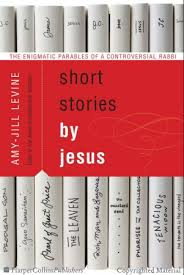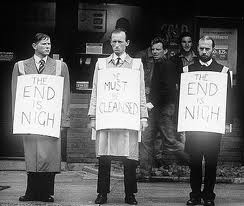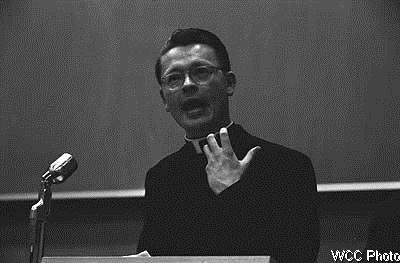
In a recent
JSNT article also publicised in
Newsweek,
Dale Martin has argued that Jesus and his armed circle saw themselves as part
of an earthly-heavenly war against the Romans and the Temple priests. The
JSNT and
Newsweek articles have provoked a detailed
two-
part response on
this blog by Brian Pounds,
related
posts
on this blog, and posts on other biblioblogs.
Mike
Bird, for instance, links to his 2006 article ‘
Jesus
and the Revolutionaries’ where, following people like N.T. Wright, he made
arguments such as this:
Jesus’ use of the phrase “Son of
Man” as a self-designation…may constitute another strand of polemic against a
revolutionary theology…it may be a
censure against the revolutionaries or those who want to usher in the kingdom through violence…Like
the rabbinic tradition of Yohanan ben Zakkai who pleaded with the Galileans to
follow Torah instead of revolution, Jesus similarly called the nation to forego
its idolatrous nationalism and, importantly, to follow him as God’s agent of
the kingdom.
Mike also refers to what he calls one of his very own ‘
memorable
quotes’: ‘[I]n supposing that Jesus was a zealot we are faced with a
problem of historical discontinuity between Jesus and his followers that is
roughly analogous to trying to explain why a group of Al-Qaeda terrorists have
traded their guns for guitars and have established a hippie commune in
down-town Manhattan.’
A commenter called ‘
Deane’
helpfully provided a quotation from Johannes Weiss on Mike Bird’s blog: ‘To
hope for the Kingdom of God in the transcendental sense which Jesus attaches to
it, and to raise a revolution, are two things as different as fire and water.’
Simon Joseph, who has had much to say on
this
issue,
including a
recent
book, has claimed
in response
to Dale Martin: ‘The Revolutionary Jesus hypothesis has long been rejected
by most New Testament scholars…I have argued…that Jesus advocated and practiced
a radical form of eschatological nonviolence.’
So the distinction between the (typically violent) ‘revolutionary’
and ‘non-revolutionary’ seems clear enough. And yet…the relatively nonviolent Jesuses of
Crossan and Wright are discussed in books which imply something about Jesus’
‘revolutionary’ status: Jesus: A
Revolutionary Biography (Crossan) and The
Original Jesus: The Life and Vision of a Revolutionary (Wright).
So here we have a range of definitions or assumptions about
what ‘revolutionary’ means (and whether it is a good or bad thing) in relation
to Jesus depending on a given scholar: a zealot-esque leader might be
‘revolutionary’ (whether rejected or accepted as a plausible model for
understanding the historical Jesus); the opposite behaviour of someone who
latched onto the idea of a ‘transcendental’ kingdom; or someone whose radical
ideas turned the world upside down. And notice that we can get scholars who
argue that Jesus had radical ideas that turned the world upside down but was presumably
not a ‘revolutionary’ and we can get a critique of ‘revolutionary theology’
versus Jesus teaching which is a
difference so strong that it requires an analogous contrast between al-Qaeda and
a Manhattan commune.
But let’s confuse things a little further. In Pauline
studies it is now, of course, obligatory to mention that philosophers like
Jacob Taubes,
Žižek, and
Alain Badiou have given distinctive philosophical readings (Terry Eagleton has
attempted something similar with Jesus, though his arguments are much more
familiar in the history of historical Jesus studies). All three present Paul in
revolutionary terms but do not really think about Paul as leading a violent
uprising to overthrow Rome. Instead they construct Paul (and sometimes Jesus)
in language unambiguously associated with some of the most popular contemporary
understandings of ‘revolution’. For Taubes, Paul stands in a revolutionary
Jewish Messianic tradition in constructing a new ‘people of God’ who overthrow
all existing categories
while more so
for Badiou who sees resurrection in Paul functioning as a revolutionary Event
much like the French Revolution or May ’68.
Žižek and
Badiou even compare Jesus and Paul to Marx and Lenin? So does
all this make Jesus and Paul ‘revolutionaries’? The authors think so.
I could try and provide a definition of ‘revolutionary’ but
instead I’m going to confuse things further still by returning to Mike Bird’s
analogy between al-Qaeda and his Manhattan commune. This distinction might not
be so clear cut. The historical and intellectual background to al-Qaeda and
related groups is, of course, complex but Marxism played its part. As has long
been noted, Marxist influences (e.g. revolutionary vanguard, anti-imperialism,
terror, internationalism, and popular justice), as well as ideas concerning totalitarianism,
are unsurprising given the prominence of Marxism in universities and the
nationalist and socialist movements in colonial, postcolonial and neo-colonial
contexts, including the Middle East, India and North Africa. Thus even Bird’s
seemingly common sense distinction can start to break down. And if we are not
fond of modern analogies, we might turn to passages from Josephus which suggest
that even the distinction between prophet and physically violent subversive is
not always clear cut (e.g. War
2.254-68).
I won’t give a serious solution to this problem but could we
say that the idea of someone attacking economic inequality and promising a
future where the first will be last (and vice versa) in a new world order, where
the core group get an especially elevated position in what would eventually
become or mimic the power it once opposed, sounds a bit like the
clichéd
pattern of the…revolution?
Update: Robert Myles has
responded and critiqued one creator of a Revolutionary Jesus who once lived in a castle














